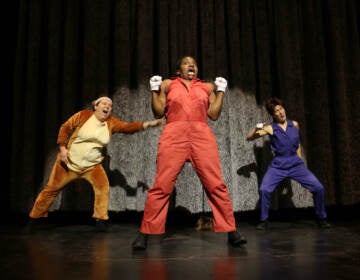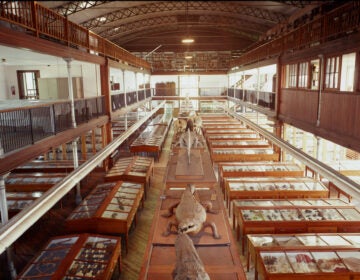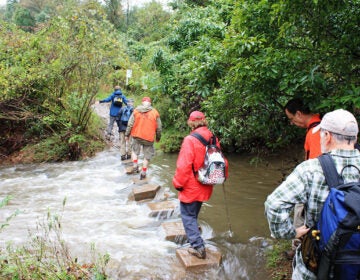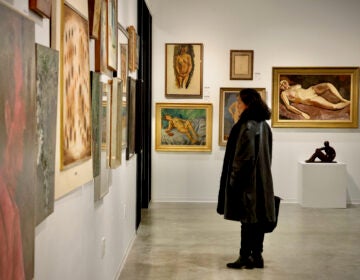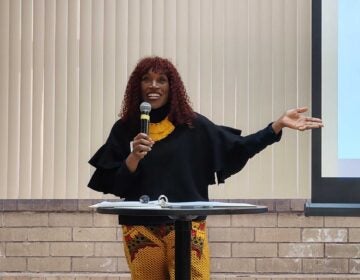‘The Wolves’ highlights ‘life, love and loss, on and off the astroturf’
"The Wolves" director, Sarah Rasmussen, says the coming of age story, in an intense 90 minutes, highlights the socially relevant issues affecting young, female athletes today.
Listen 6:00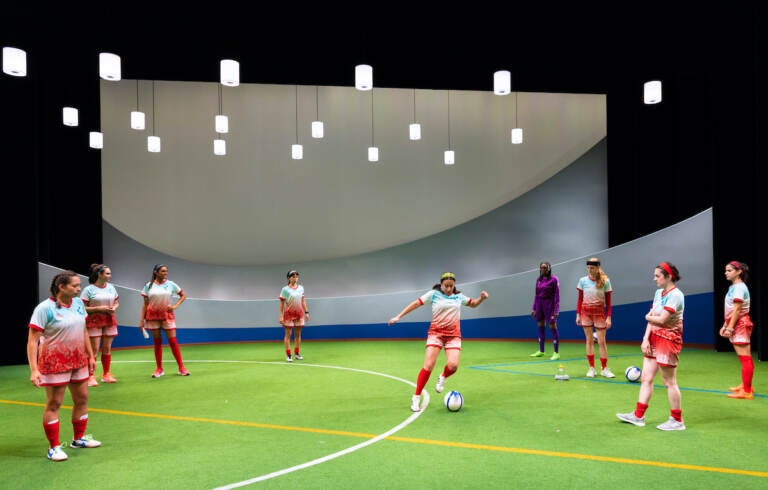
(From left to right) Maggie Thompson, Isabel Pask, Jasmine Sharma, Mikey Gray, Maria Habeeb, Renea Brown, Katie Griffith, Owen Laheen, Annie Fox in ''The Wolves.'' (Photo by Charles T. Erickson)
Ever wondered what teenage girls are thinking and the pressures that they face, especially as a high school athlete?
Well, “The Wolves,” a 2016 play by Sarah DeLappe, about nine young women from a competitive high school soccer team tries to answer that question. The play is a story about life, love, and loss on and off the astroturf.
The play received multiple awards and was a finalist for the 2017 Pulitzer Prize for Drama. It’s the season opener at McCarter Theater in Princeton.
WHYY host Priyanka Tewari spoke with the artistic director at McCarter, Sarah Rasmussen, who is also the director of “The Wolves.”
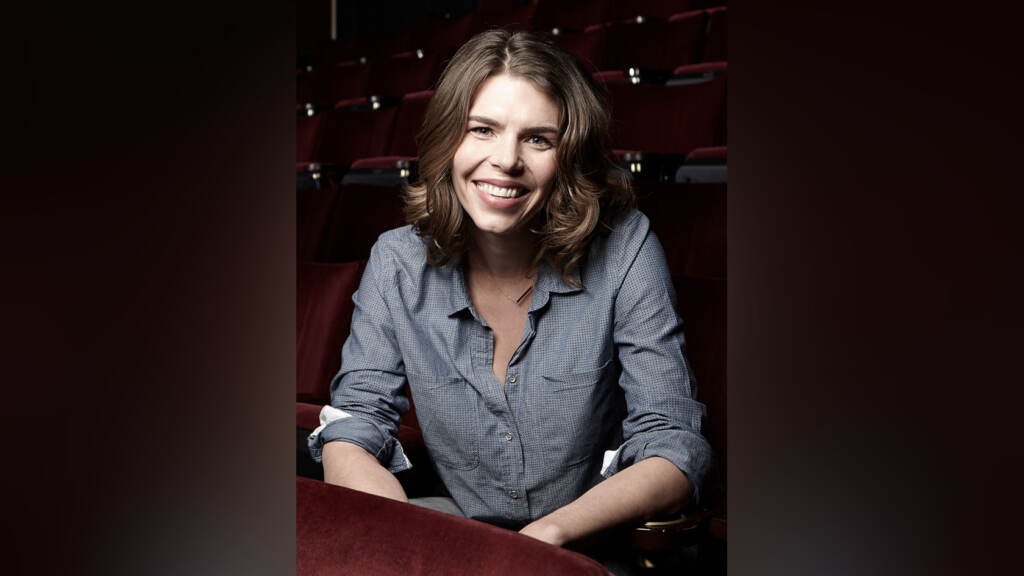
Note: This transcript has been edited for clarity.
What made you gravitate towards this play and why did you think it would be a good choice for the season opener at McCarter?
Rasmussen: It’s just a great play. It’s a great ride. It’s 90 minutes. It’s action packed. I think it does what a great drama can do, which is at the beginning of it, one thinks… ‘Oh, these are nine women on stage, all in the same uniform. How will I tell them apart?’ And I tell you 90 minutes later, you feel like you’ve known each of these women for years and you deeply care about [them] and you’ve seen them go on this journey. I think that’s a testament to Sarah Delappe, The playwright’s writing. In 90 minutes, we see people transform, we see them soar, we see them fall, we see them come back up. It’s just, it’s so precise and compelling. It’s a really special play. And I think that’s why people have been responding so strongly to it.
The play was written by DeLappe in 2016. A lot has happened since then and teenagers especially have had to contend with a lot. Are the conversations in this play still relevant in 2022?
Rasmussen: I think in some ways they’re even more relevant. There’s aspects of the play that really look at female sexuality and bodily autonomy. I think those questions are especially very poignant in light of recent months in the US. So I think that a lot of it feels timeless in that the pressures that young athletes face — the coming of age story. The play begins with a Gertrude Stein quote that says ‘We are always the same age inside’ and I think that to me speaks to we’re always, in a way, carrying this version of ourselves that is very embedded into who we are. So seeing the complexity of how these young women approach the world and the larger questions of the world and growing up and politics and all of that is, I think, endlessly fascinating.

The play actually has a very diverse cast. So how does the process of finding the right cast work in a theater production?
Rasmussen: That’s a great question. It is a very diverse cast. We wanted, you know, to reflect the incredibly diverse community that we’re in and our audiences. We auditioned with a great casting company out of New York City. We also worked with a soccer coach, Heather Catherine Driscoll, who is amazing and helps make us a team.
When you are directing or when you were looking at the performances in rehearsal, was there anything in particular that really stuck out for you, which perhaps wasn’t a part of the original script, but you decided to keep? Were there any surprises?
Rasmussen: That’s a wonderful question that there’s a lot that’s open to interpretation. One thing I love as a director is this really is a play that I loved collaborating with designers on. We had an all female design team, a very diverse team of women. And, there’s so much within the play to just as a director say, okay, it doesn’t say how this all unfolds on stage. So we get to make our own compositions, our own stage picture. I love the movement of it. There’s balls being kicked, there’s people moving it stretching and warming up for a game and it has just a real energy to it. We’re just so excited. This piece honors that, that athleticism and courage and determination of young female athletes.
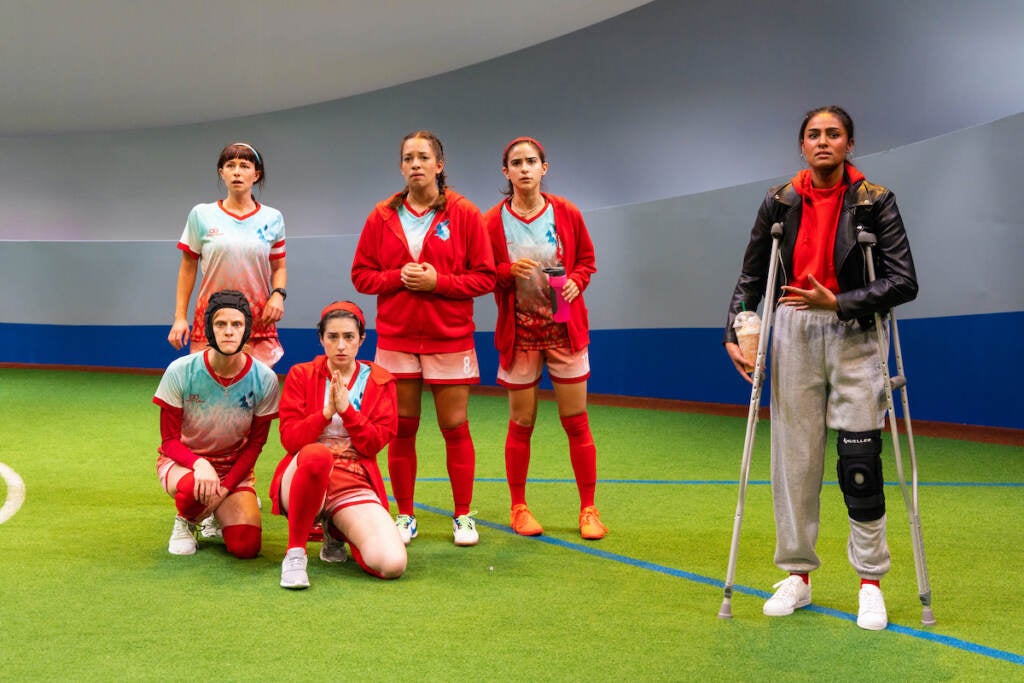
Not only are you the director of “The Wolves,” but as the artistic director at McCarter, having started during or at the height of the pandemic in 2020, what is your vision for McCarter and the kind of works that you want the community to see?
Rasmussen: McCarter is such a gem. We do so many different kinds of art here, and not only do we do great plays and musicals, we also do dance and family friendly programming and music. I hope people will check us out at McCarter.org. My vision for the future is really to have a place that is that hub of both seeing great art, but also engaging in the larger questions about what it means to be human. We’ve spent a lot of time as a staff really delving into what we want our values to be moving forward. What we landed on is that we want to champion both justice and joy in our work. So we want incredibly equitable, diverse work, but also work that energizes us and brings some joy to our lives, and also a sense of belonging for our audiences. So we are, you know, we’re really optimistic about the future here. It’s just so wonderful to be engaging with people of all ages now in our theaters, in our classrooms, in our communities. That’s really exciting.

WHYY is your source for fact-based, in-depth journalism and information. As a nonprofit organization, we rely on financial support from readers like you. Please give today.


